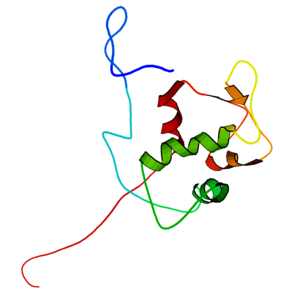Karen Vousden facts for kids
Quick facts for kids
Karen Vousden
|
|
|---|---|
| Born | 19 July 1957 |
| Alma mater | Queen Mary and Westfield College |
| Known for | Work on p53 tumour suppressor protein and Mdm2 protein |
| Spouse(s) |
Robert Ludwig
(m. 1986) |
| Awards | |
| Scientific career | |
| Fields | Cancer |
| Institutions |
|
| Thesis | Use of suppressor gene mutations to study transfer RNA redundancy in Coprinus' (1982) |
Karen Heather Vousden (born 19 July 1957) is a British medical researcher. She is famous for her research on a special protein called p53. This protein helps stop cancer from growing. She also found out how another protein, Mdm2, controls p53. Scientists think Mdm2 could be a good target for new cancer medicines.
From 2003 to 2016, she led the Cancer Research UK Beatson Institute in Glasgow, UK. In 2016, she moved back to London. There, she became the Chief Scientist at Cancer Research UK (CRUK). She also became a Group Leader at the Francis Crick Institute.
Contents
Karen Vousden's Education
Karen Vousden went to Gravesend Grammar School for Girls. She earned a Bachelor of Science degree in genetics and microbiology in 1978. She then got her PhD from Queen Mary College, University of London. Her PhD research looked at how certain gene changes affect a fungus called Coprinus.
Karen Vousden's Career Journey
After her PhD, Dr. Vousden worked as a researcher. Her early jobs were at the Institute of Cancer Research in London. She also worked at the National Cancer Institute in Bethesda, USA.
From 1987 to 1995, she led a group studying Human Papillomaviruses. This was at the Ludwig Institute for Cancer Research in London. In 1995, she joined the National Cancer Institute in Frederick, USA. She held several important roles there until 2002.
From 2003 to 2016, she was the director of the Cancer Research UK Beatson Institute in Glasgow. She helped expand the institute. She also led a research group focused on stopping tumors. Since 2016, she has been a Chief Scientist at CRUK. She also leads a research group at the Francis Crick Institute. In 2018, she was chosen as a foreign associate of the National Academy of Sciences.
Understanding Cancer Research
Human Papillomaviruses (HPVs)
Dr. Vousden's early work looked at human papillomaviruses (HPVs). These viruses are linked to cervical cancer. She helped find out which parts of HPV-16 make cells grow without stopping. She also showed that a protein from HPV-16, called E6, attaches to the human tumor suppressor protein p53. This causes p53 to break down.
The p53 Protein: A Cancer Fighter
Dr. Vousden's recent research has focused on p53. This gene is very important in stopping tumors from forming. When cells are stressed, like from DNA damage, p53 can make them "self-destruct." This process is called apoptosis. Her work has helped explain how this happens. She discovered a key protein in this process called PUMA.
In a healthy cell, p53 is carefully controlled. This stops it from being active when it's not needed. Dr. Vousden found that a protein called Mdm2 is key to this control. She showed that Mdm2 marks p53 for destruction. This keeps p53 levels low when the cell is normal.
Scientists believe that reactivating p53 can stop some tumors from growing. This makes Mdm2 an interesting target for new cancer treatments. Since Mdm2 only targets a few proteins, a medicine that stops it might have fewer side effects. Dr. Vousden's team has been studying Mdm2's structure. They are looking for molecules that can stop Mdm2 from working. Some promising compounds have been found in lab studies.
Dr. Vousden's group also found a new protein called TIGAR. This protein is controlled by p53. TIGAR can help reduce stress in cells. It might help p53 repair minor damage to cells.
Awards and Honors
Dr. Vousden has received many awards for her work. She became a fellow of the Royal Society in 2003. She also became a fellow of the Royal Society of Edinburgh in 2004. In 2006, she became a fellow of the Academy of Medical Sciences. She was also elected a member of the European Molecular Biology Organization in 2004.
The Institute of Cancer Research gave her an Honorary Doctorate in Science in 2006. She gave a special lecture for the Biochemical Society in 2008. In 2009, she received the Royal Medal from the Royal Society of Edinburgh. She was also appointed Commander of the Order of the British Empire (CBE) in 2010.
In 2004, The Scotsman newspaper named Dr. Vousden among the 25 most powerful Scottish women. In 2021, she received the first Pezcoller Foundation-Marina Larcher Fogazzaro-EACR Women in Cancer Award.
See also
 In Spanish: Karen Vousden para niños
In Spanish: Karen Vousden para niños
 | Lonnie Johnson |
 | Granville Woods |
 | Lewis Howard Latimer |
 | James West |


